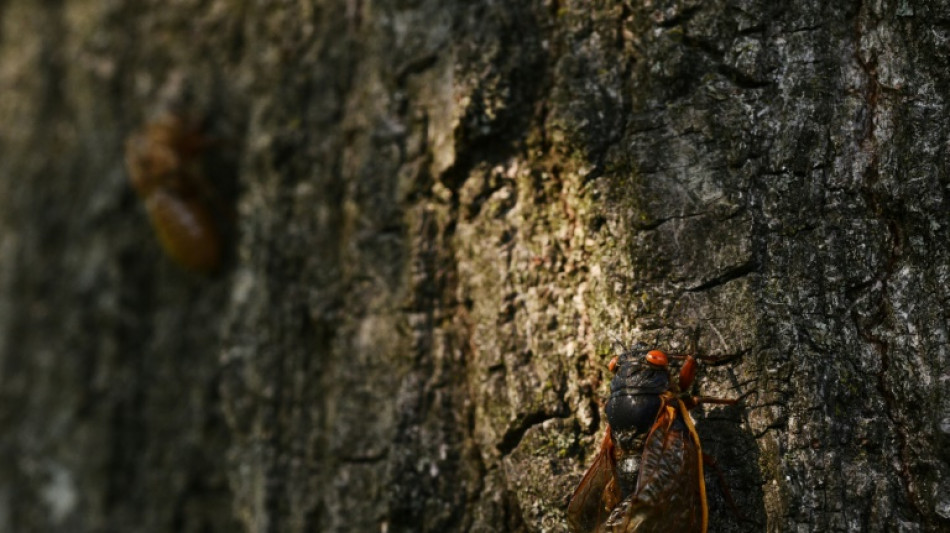
-
 Bangladesh's Tarique Rahman poised to be PM as Islamists concede
Bangladesh's Tarique Rahman poised to be PM as Islamists concede
-
What does Greenland's mining industry look like?

-
 Greenland prepares next generation for mining future
Greenland prepares next generation for mining future
-
China top court says drivers responsible despite autonomous technology

-
 Sixers rookie Edgecombe leads 'Team Vince' to NBA Rising Stars crown
Sixers rookie Edgecombe leads 'Team Vince' to NBA Rising Stars crown
-
Rubio at Munich security meet to address Europeans rattled by Trump

-
 Medal-winner Sato says Malinin paid for 'toxic schedule'
Medal-winner Sato says Malinin paid for 'toxic schedule'
-
Carney offers support of united Canada to town devastated by mass shooting

-
 All-in on AI: what TikTok creator ByteDance did next
All-in on AI: what TikTok creator ByteDance did next
-
Healthy Ohtani has Cy Young Award in sights

-
 One of Lima's top beaches to close Sunday over pollution
One of Lima's top beaches to close Sunday over pollution
-
'Nothing is impossible': Shaidorov shocks favourite Malinin to make history

-
 Malinin wilts at Olympics as Heraskevych loses ban appeal
Malinin wilts at Olympics as Heraskevych loses ban appeal
-
Bhatia joins Hisatsune in Pebble Beach lead as Fowler surges

-
 Malinin meltdown hands Shaidorov Olympic men's figure skating gold
Malinin meltdown hands Shaidorov Olympic men's figure skating gold
-
Top seed Fritz makes ATP Dallas semis with fantastic finish

-
 Patriots star receiver Diggs pleads not guilty to assault charges
Patriots star receiver Diggs pleads not guilty to assault charges
-
Havana refinery fire under control as Cuba battles fuel shortages

-
 Peru Congress to debate impeachment of interim president on Tuesday
Peru Congress to debate impeachment of interim president on Tuesday
-
Snowboard veteran James targets 2030 Games after Olympic heartbreak

-
 Costa Rica digs up mastodon, giant sloth bones in major archaeological find
Costa Rica digs up mastodon, giant sloth bones in major archaeological find
-
Trump says change of power in Iran would be 'best thing'

-
 Paris police shoot dead knife man at Arc de Triomphe
Paris police shoot dead knife man at Arc de Triomphe
-
Japan's Totsuka wins Olympic halfpipe thriller to deny James elusive gold

-
 Canada's PM due in mass shooting town as new details emerge
Canada's PM due in mass shooting town as new details emerge
-
Neto treble fires Chelsea's FA Cup rout of Hull

-
 Arbitrator rules NFL union 'report cards' must stay private
Arbitrator rules NFL union 'report cards' must stay private
-
Dortmund thump Mainz to close in on Bayern

-
 WHO sets out concerns over US vaccine trial in G.Bissau
WHO sets out concerns over US vaccine trial in G.Bissau
-
Skeleton racer Weston wins Olympic gold for Britain

-
 Ex-CNN anchor pleads not guilty to charges from US church protest
Ex-CNN anchor pleads not guilty to charges from US church protest
-
Berlin premiere for pic on jazz piano legend Bill Evans

-
 Fire at refinery in Havana as Cuba battles fuel shortages
Fire at refinery in Havana as Cuba battles fuel shortages
-
A Friday night concert in Kyiv to 'warm souls'

-
 PSG stunned by rampant Rennes, giving Lens chance to move top
PSG stunned by rampant Rennes, giving Lens chance to move top
-
Japan's Totsuka wins Olympic halfpipe thriller as James misses out on gold

-
 Indian writer Roy pulls out of Berlin Film Festival over Gaza row
Indian writer Roy pulls out of Berlin Film Festival over Gaza row
-
Conflicts turning on civilians, warns Red Cross chief

-
 Europe calls for US reset at security talks
Europe calls for US reset at security talks
-
Peru leader under investigation for influence peddling

-
 Rising star Mboko sets up Qatar Open final against Muchova
Rising star Mboko sets up Qatar Open final against Muchova
-
Canada PM to mourn with grieving town, new details emerge on shooter

-
 US waives Venezuela oil sanctions as Trump says expects to visit
US waives Venezuela oil sanctions as Trump says expects to visit
-
NBA star Chris Paul retires at age 40 after 21 seasons

-
 WTO chief urges China to shift on trade surplus
WTO chief urges China to shift on trade surplus
-
Vonn hoping to return to USA after fourth surgery on broken leg

-
 Trump sending second aircraft carrier to pile pressure on Iran
Trump sending second aircraft carrier to pile pressure on Iran
-
Heraskevych loses Olympics disqualification appeal, Malinin eyes second gold

-
 Mercedes have 'taken a step back': Russell
Mercedes have 'taken a step back': Russell
-
Madagascar cyclone death toll rises to 40, water, power still out


Seventeen years later, Brood XIV cicadas emerge in US
The last time these thrumming, red-eyed bugs burrowed out of the ground across America's suburbs and woodlands was the early summer of 2008.
Global financial jitters were mounting, iPhones were a luxury item, and George W. Bush was still president.
Now, reports from the citizen-science app Cicada Safari show the first insects of Brood XIV -- which emerges every 17 years -- surfacing in the US South. As ground temperatures warm across the North, millions more are expected to follow.
Cicadas belong to the insect order Hemiptera, which includes stink bugs, bed bugs, and aphids.
But they are often mistaken for locusts, a confusion that dates back to early English settlers who likened the mass emergences to Biblical plagues. Brood XIV itself was first documented in 1634.
There are roughly 3,500 species of cicadas globally, many still unnamed.
But periodical cicadas -- which emerge en masse after 13 or 17 years -- are unique to the eastern United States, with two additional unrelated species found in northeastern India and Fiji, says Chris Simon, a leading cicada expert at the University of Connecticut.
"Everybody's fascinated by them, because you see nothing for 13 or 17 years, and then all of a sudden, your house and car are covered in these insects," Simon told AFP.
"This is a marvelous phenomenon that you can take your kids to see and marvel at, watch them come out of their shells and wonder about how they evolved," she added, urging the public to appreciate, not fear them.
"The world wouldn't survive without insects."
Because their emergence years are staggered, different periodical cicada broods appear in different years. In 2024, a rare "double whammy" occurred when the 13-year Brood XIX overlapped with the 17-year Brood XIII.
That's not the case in 2025, but excitement remains high around these mysterious critters, which continue to intrigue scientists -- especially given that the evolutionary logic behind their prime-numbered life cycles remains unresolved.
Cicadas are often thought of as "creatures of history," conjuring memories of past life chapters -- what you were doing when this brood last emerged.
They spend nearly their entire lives underground, passing through life stages called instars, before tunneling to the surface for a brief few weeks to molt, mate, and die -- while their newly hatched offspring drop from trees and burrow into the soil, beginning the cycle anew.
Males produce their deafening mating calls using tymbals, sound-producing membranes on either side of their abdomens, creating a chorus that's been likened to sirens or power tools.
They don't bite or sting, and they don't eat solid food in their adult form, though they drink water.
Instead, their defense is overwhelming abundance -— swarming in such numbers that they satiate predators like birds, raccoons, foxes, and turtles, playing a crucial role in the ecosystem.
But their survival strategy is increasingly challenged by human-caused changes.
Widespread deforestation and urbanization have destroyed habitat. And now, climate change is triggering more frequent occurrences of "stragglers" -- cicadas that emerge four years too early or too late, often in numbers too small to survive, which could threaten long term population numbers.
Simon added that in areas like the capital Washington, these asynchronous emergences are forming "a patchy mosaic" of overlapping broods.
Then there's the political climate. Under President Donald Trump, the federal government has fired scientists en masse and frozen funding for new research.
Simon submitted a grant proposal last August to the National Science Foundation for a major genetic study into cicadas' internal clocks -- biological mechanisms that somehow track the passage of years, unlike humans' 24-hour circadian cycles.
"Nobody knows what's happening," she said, decrying the current attacks on science.
P.Mathewson--AMWN



